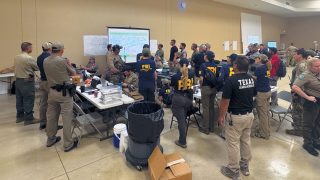
Powerless over alcohol
Sometimes we see a colleague’s life become unmanageable because they are powerless over alcohol. No amount of trying or practicing or self-control will change the way alcohol is affecting their brain.
This is the insanity of alcoholism: “People drink because they like how alcohol makes them feel. This feeling is so elusive that, even though an alcoholic admits it is injurious, they eventually cannot differentiate between what is true and what is false. To them, the alcoholic life seems the only normal life” (Big Book of Alcoholics Anonymous).
Alcoholism is a chronic disease that only gets worse over time. It can be diagnosed and treated, but not cured. It carries a risk of relapse.
Do you accept that you cannot control your colleague’s drinking? You can see the effects of the drinking. You didn’t cause it. You can’t control it. You can’t cure it. You, too, are powerless over the problem of alcoholism, and you are not alone. These truthful, accurate thoughts bring release and hope.
Higher power
Colleagues can choose to find a power greater than themselves (because they know they cannot control the alcohol themselves), and each person can choose their own higher power. For the faithful, God is the higher power. For others, it might be beauty, love or the group itself. Regardless of their higher power, officers working sobriety report that the Serenity Prayer helps: God grant me the serenity to accept the things I cannot change, courage to change the things I can and wisdom to know the difference.
Change attitude and actions
Your colleague would benefit from a change in attitude and actions. Once they realize how much their thinking is distorted, they will realize how unwise some of their actions have been and, perhaps, how unloving some of their attitudes have been.
Consider your own attitudes and actions. How can you turn a situation over and let go of the results, including when it comes to your colleague? What can you do when your colleague has made decisions that you don’t like?
Receive by sharing
Research demonstrates that Alcoholics Anonymous — the 12 Steps — is the most effective “treatment” for alcoholism. It works better than psychotherapy alone. It works better than psychotherapy and medication.
Why does a bunch of alcoholics getting together to share and re-share and re-share their sobriety stories yield superior outcomes for those officers wanting to get and stay sober? What is the magic ingredient?
Have you heard the saying “You only get to keep what you give away?” Well, this is true when it comes to sobriety. This is also true when it comes to helping your colleague move from despair to hope and love. Comfort comes to both giver and receiver.
What to say
First, consider if your colleague sees alcohol as something that has negatively impacted their life or the lives of others (such as their spouse). Consider asking your colleague: “Are you worried that sometimes drinking alcohol has been an issue?” “Have you ever thought you might want to drink less?”
You could consider common questions that a police psychologist might ask: “Have you ever felt you needed to cut down on your drinking?” “Have people annoyed you by criticizing your drinking?” “Have you ever felt guilty about drinking?” “Have you ever felt you needed a drink first thing in the morning (eye-opener) to steady your nerves or to get rid of a hangover?”
Prepare to speak to your colleague ahead of time. Pick a good time, and ensure they are not under the influence of alcohol. Don’t react with anger or confrontation, even if your colleague is defensive or upset.
Avoid blame and accusations. Express concern and worry (as opposed to frustration). Listen to what your colleague is willing to share.
Provide some real examples of how your colleague’s drinking might have impacted them or others, such as “I was pretty concerned when you wanted to drive home and wouldn’t let me give you a ride.” Remember, some peers may black out and not recall everything that occurred. “Sometimes your behavior changes, and you get angry when you drink.”
Don’t give mixed messages. Make it a point to not laugh at some of your colleague’s behavior or normalize any of the negative consequences.
Be prepared for resistance. Recognize that it is normal for people to not always want to hear what you have to say. Be content knowing you might have planted the first seed or might be the fourth person to say something to them that brings about change. “I realize this might be tough to hear, but I just want you to think about it, and reflect on some of the things we talked about.”
What to do
Reach out: Text your colleague. Ask to get together for coffee or lunch. Call your colleague. Ask how they are doing. Tap your colleague on the shoulder. Do this in the parking lot or other private area. Let them know you see them. You see them; even this alone is an act of love.
Connect: Follow through with your courtesy outreach efforts to your colleague. Share your observations, your care and concern, your desire to listen. Be mindfully present; this too is an act of love.
Offer help: Share relevant resources. Offer to take your buddy where they need to go.
- Peer support personnel, particularly those who are OG sober
- Department (or EAP) police psychologist
- Department addictions counselor, particularly one who is sworn
- Fellow officers who openly talk about their sobriety journey
- Peace Officer’s Fellowship (POF) meetings (AA meetings solely for law enforcement personnel)
- Alcoholics Anonymous (AA) meetings (in person or online 24/7/365 around the world)
- AA sponsor (an alcoholic with one or more years of sobriety and shares their experience on a continuous, individual basis with another alcoholic who is attempting to get or stay sober)
- Inpatient rehabilitation (a team of medical specialists at a rehabilitation facility who supervise the physical and psychological care of your colleague, typically for a period of 30 days, to ensure your buddy is clean and sober and on the right track)
- Intensive outpatient care (which allows your colleague the flexibility to return home daily so that work, family and other obligations may be able to continue during recovery)
- Law Enforcement Addiction Network (an interdisciplinary team of substance abuse task force members who provide pro bono consultation to law enforcement personnel and agencies)
- Alcohol-free weekend during April for Alcohol Awareness Month (which increases your colleague’s awareness; if it was difficult for your colleague to manage 72 hours without drinking, then this is important feedback)
- Al-Anon meetings and family groups (parallel 12-step program for family members who have been impacted by your colleague’s alcoholism)





